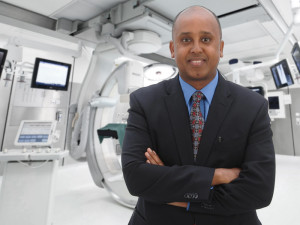Dr. Mustafa Ahmed with Southern Nevada Bariatrics Offers Tips to Patients Considering Surgery as an Option
Las Vegas, NV (PRWEB) September 06, 2017
“Personal commitment, motivation and a strong desire to ‘enjoy’ one’s new lifestyle” are the true ingredients driving the success of any medical weight-loss program, according to surgeon, Mustafa Ahmed, MD, of Southern Nevada Bariatrics. “Gastric surgery is simply a tool. To achieve permanent weight loss and overall improved health, a patient must willingly commit to life-long changes in nutrition and exercise habits,” emphasized Dr. Ahmed, who is board-certified in internal medicine, surgery and surgical critical care.
Dr. Ahmed’s comments follow release of several recent weight-loss studies, all indicating the long-term success of surgical interventions in treating obesity, a chronic disease.
A study published in May of this year (2017) in the International Society for Microbial Ecology Journal determined that a common surgical therapy to reduce the size of the stomach – Roux-en-Y gastric bypass (RYGB) – generated a highly diverse, healthy community of microbes in a patient’s gut. This new, microbial milieu may be responsible, at least in part, for helping surgical patients maintain weight loss for long periods of time, scientists said. Low diversity of gut-dwelling bacteria is associated with obesity, as well as with a variety of other diseases, including ulcerative colitis and inflammatory bowel disease.
In research presented November 2016 at a conference hosted by the American Society for Metabolic and Bariatric Surgery and the Obesity Society, authors reported a significant increase in long-term survival benefits for patients, especially older patients, who underwent gastric-bypass surgery. Specifically, the study found “significant improvement or remission in diabetes and high blood pressure” among the nearly 2,700 patients who underwent gastric surgery between 2004 and 2014.
“What these studies are telling us is that metabolic-bariatric surgery is proving to be the most effective and long-lasting treatment for severe obesity, which is linked to higher rates of heart disease, high blood pressure, sleep apnea, some cancers and many other diseases,” said Dr. Ahmed, who specializes in a variety of surgical gastric interventions. They include RYGB; vertical sleeve gastrectomy, in which a large portion of a stomach is removed; and gastric band, which is a minimally invasive procedure.
A report by the Agency for Healthcare Research and Quality indicates that enhancements to gastric surgery safety, particularly development of improved laparoscopic techniques, have lowered the risk of death from such surgery to 0.1 percent and reduced the overall likelihood of major complications to just 4 percent.
“Gastric – or bariatric – surgery is not simply a way out for morbidly obese patients who otherwise are unable to shed pounds through normal dieting and exercise,” Dr. Ahmed explained. “The regulation of appetite, calorie-burn, weight and body composition is a complex process. For example, a person who has dropped from 220 to 180 pounds burns fewer calories than a 180-pound individual who never dieted.”
The National Institutes of Health (NIH) has indicated that, without some type of metabolic or surgical intervention, maintaining long-term weight loss is almost impossible for the severely obese patient, Dr. Ahmed added.
Dr. Ahmed offers these tips to patients who may be considering surgery as a weight-loss option. Potential candidates:
Should be100 pounds or more above their ideal weight, with a body mass index (BMI) of 40, or have a BMI of 35 or more and suffer from other, serious, obesity-related disorders
Failed other weight-loss methods
Understand that gastric surgery is a life-changing and “permanent” event
Remain psychologically stable and committed to making the nutritional and behavioral changes necessary to keep the weight off following surgery.
Reviewing the “pros and cons” of bariatric surgery, authors of a 2012 article in F1000 Medicine Reports wrote that, “at present, weight loss surgery is the most effective and sustainable treatment option for severe obesity as long as the individual is motivated to make the lifestyle changes required.”
Dr. Ahmed concurs. “The success of any weight-loss surgery is very much dependent on a patient’s age, overall health, weight before surgery, ability to exercise, commitment to dietary guidelines and motivation, including support of family and friends,” he said.
Obesity has reached epidemic proportions globally, and, because it has, so have obesity-related diseases like Type 2 diabetes mellitus. “Gastric surgery is a way of restoring long-term health, hope and self-esteem to seriously obese patients who have no other options,” Dr. Ahmed said.
Southern Nevada Bariatrics is a Las Vegas-based weight loss program offering patients individualized weight loss care. https://southernnevadabariatrics.com
Mustafa Ahmed, MD, FACS, is board certified in surgery, surgical critical care and internal medicine. He is an obesity expert, bariatric surgeon and medical weight loss management specialist and the founder of Southern Nevada Bariatrics.

